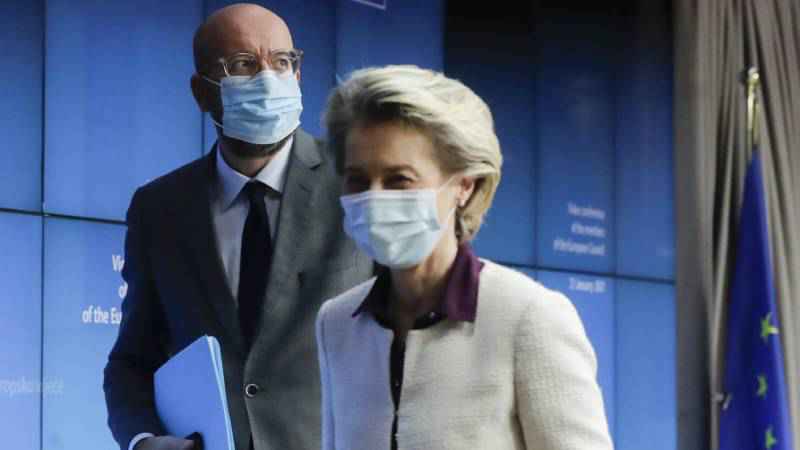EU pressures AstraZeneca to deliver vaccines as promised

European Council President Charles Michel, left, and European Commission President Ursula von der Leyen leave after a joint news conference at the end of a EU summit video conference at the European Council headquarters in Brussels, Thursday, Jan. 21, 2021.[Olivier Hoslet, Pool Photo via AP]
The European Union lashed out Monday at the pharmaceutical giant AstraZeneca, accusing the company of failing to deliver the coronavirus vaccine doses that it promised to the bloc despite getting EU funding to ramp up vaccine production.
The EU, already facing heavy criticism for a slow vaccine rollout around its 27 nations, also warned that within days it will demand approving the export of any COVID-19 vaccines produced within the bloc.
“The European Union will take any action required to protect its citizens and its rights," Health Commissioner Stella Kyriakides said.
The EU, which has 450 million citizens and the economic and political clout of the world’s biggest trading bloc, is lagging badly behind countries like Israel and Britain in rolling out coronavirus vaccine shots for its health care workers and most vulnerable people. That’s despite having over 400,000 confirmed virus deaths since the pandemic began.
Kyriakides immediately got the support from the bloc’s largest member on the vaccine export controls plan.
“We, as the EU, must be able to know whether and what vaccines are being exported from the EU,” German Health Minister Jens Spahn said. “Only that way can we understand whether our EU contracts with the producers are being served fairly. An obligation to get approval for vaccine exports on the EU level makes sense.”
European Commission President Ursula von der Leyen held urgent talks Monday with AstraZeneca chief Pascal Soriot, and EU nations also met with AstraZeneca to encourage the British-Swedish company to ramp up its vaccine production and meet its contractual targets.
“The answers of the company have not been satisfactory so far," said Kyriakides and added a follow-up meeting was planned late Monday.
The European Medicines Agency is scheduled to review the Oxford-AstraZeneca coronavirus vaccine Friday and its approval is hotly anticipated. The AstraZeneca vaccine is already being used in Britain and has been approved for emergency use by half a dozen countries, including India, Pakistan, Argentina and Mexico.
AstraZeneca’s announcement that it will deliver fewer vaccines to the EU early on has only increased pressure on the 27-nation bloc, especially since Pfizer-BioNTech, the first vaccine to get EU approval, failed last week to keep up its promised deliveries to the EU. Pfizer has temporarily reduced vaccine deliveries to the EU and Canada as it revamps its plant in Belgium to increase overall production. Italy has threatened to sue Pfizer for the delays.
The political pressure spurred the European Commission, which is the EU’s executive, into action Monday, with von der Leyen’s phone call to the AstraZeneca chief.
“She made it clear that she expects AstraZeneca to deliver on the contractual arrangements foreseen in the advance purchasing agreement," said her spokesman Eric Mamer.
“She reminded Mr. Soriot that the EU has invested significant amounts in the company up front precisely to ensure that production is ramped up even before the conditional market authorization is delivered by the European Medicines Agency."
The company said in a statement that Soriot "stressed the importance of working in partnership and how AstraZeneca is doing everything it can to bring its vaccine to millions of Europeans as soon as possible.”
The delays will be make it harder to meet early targets in EU’s goal of vaccinating 70% of its adult population by late summer.
European Council President Charles Michel said the EU already “pounded our fist on the table” with Pfizer last week to ensure that the delays end by the end of this week.
The EU has signed six vaccine contracts for more than 2 billion doses, but only the Pfizer-BioNTech and Moderna vaccines have been approved for use so far.